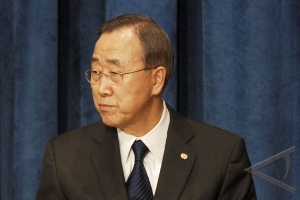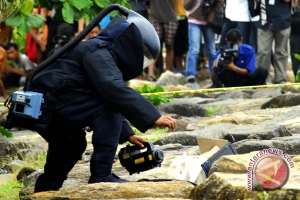
Rebels praying for their dead in Libya. — Reuters pic
BENGHAZI, Libya, April 6 — The head of Libya's rebel army has condemned Nato for its slow chain of command in ordering air strikes to protect civilians, saying the alliance was "letting the people of Misrata die every day."
The besieged city of Misrata, the only big population centre in western Libya where a revolt against Gaddafi has not been crushed and which faces army tanks and snipers, is now the priority for Nato air strikes, alliance officials said earlier.
"Nato blesses us every now and then with a bombardment here and there, and is letting the people of Misrata die every day," Abdel Fattah Younes, head of the rebel forces said in the eastern stronghold city of Benghazi. "Nato has disappointed us."
In reaction, Nato said it was carrying out its mandate.
Nato took over from a coalition led by the United States, Britain and France on March 31, putting the alliance in charge of air strikes targeting Gaddafi's military infrastructure as well as policing a no-fly zone and an arms embargo.
Nato had been moving very slowly, allowing Gaddafi forces to advance, Younes said, adding rebels were considering referring the issues with Nato to the UN Security Council which authorised its mission. "Nato has become our problem," he said.
A rebel spokesman said Misrata was hit again yesterday.
"Misrata was shelled with tank fire, artillery and mortars," the rebel, called Abdelsalam, told Reuters, adding: "Unfortunately Nato operations have not been effective in Misrata. Civilians are dying every day."
Stalemate on the frontline of fighting in eastern Libya, defections from Gaddafi's circle and the plight of civilians caught in fighting or facing food and fuel shortages has prompted a flurry of diplomacy to find a solution to the civil war in this oil-producing North African desert state.
Protests against the government that began on February 15 swiftly descended into civil war after Gaddafi forces opened fire on demonstrators. He then crushed uprisings in Libya's west, leaving the east and Misrata in rebel hands.
SECURITY COUNCIL
Nato-led air power is holding the balance in Libya, preventing Gaddafi forces from overrunning the rebels but unable for now to hand them outright victory.
"Either Nato does its work properly or I will ask the (rebel) national council to raise the matter with the Security Council," Younes, a former interior minister in Gaddafi's administration who defected, told reporters.
"The reaction of Nato is very slow. One official calls another and then from the official to the head of Nato and from the head of Nato to the field commander. This takes eight hours," Younes said, adding:
"Misrata is being subjected to a full extermination."
Asked about Younes's remarks, Nato spokesman Oana Lungescu said: "The facts speak for themselves. The pace of operations since Nato took over has not abated. We have conducted 851 sorties in the past six days ... we are fulfilling our mandate."
Another Nato official said: "The rebels may not see us. We may be 100 or 150km away. We are some distance from where the fighting is going on so the rebels are not aware."
Earlier in the day, Nato had given details of the campaign.
"The assessment is that we have taken out 30 per cent of the military capacity of Gaddafi," Brigadier General Mark van Uhm, a senior Nato staff officer, said in Brussels.
Over the last day, air strikes around Misrata hit Gaddafi's tanks, air defence systems and other armoured vehicles. Near Brega in the east, where intense fighting raged for a sixth day yesterday, Nato aircraft struck a rocket launcher.
HUMAN SHIELDS
Answering earlier criticism by insurgents that air power was less effective with the alliance in control, Nato officials said the presence in Libyan skies was undiminished.
Van Uhm said Gaddafi was using civilians as human shields and hiding his armour in populated areas, curbing Nato's ability to hit targets. "The operational tempo remains, but we have seen a change of tactics (from Gaddafi)," he said. "When human beings are used as shields we don't engage."
Addressing Nato, Younes said: "They say they don't want to bomb in order not to kill civilians. The area where Gaddafi troops are does not include civilians."
Abdelsalam in Misrata agreed. "Nato says Gaddafi's forces are hiding among civilians. But we tell them that there are no civilians left in the areas where the Gaddafi forces are positioned. We urge them to destroy civilian property to take out the snipers and armed gangs."
After a series of rapid rebel advances followed by headlong retreats, the insurgents held their ground for six days in Brega, putting their best trained forces in to battle for the oil town and keeping the disorganised volunteers away.
A sustained government bombardment of rockets and mortar bombs, however, pushed the insurgent pick-up truck cavalcade back toward the rebel stronghold of Benghazi, their biggest retreat in several days of inconclusive battles.
"Since the day Nato took over the air strikes, we have been falling back," said Ziad el Khafiefy, 20, a rebel fighter, echoing Younes's comments.
"Gaddafi's troops are hitting us with Grad missiles," said Mabrouk el Majbary, 35. "Something is wrong ... When the US gave leadership to Nato, the bombings stopped."
GADDAFI FACES ICC
As the row erupted over the military campaign, the International Criminal Court said today it had evidence Gaddafi's government had developed plans to crush protests by killing civilians even before the uprising in Libya broke out.
"We have evidence that after the Tunisia and Egypt conflicts in January, people in the regime were planning how to control demonstrations inside Libya," court prosecutor Luis Moreno-Ocampo told Reuters in The Hague.
"The planning at the beginning was to use tear gas and (if that failed to work) ..., shooting," said Moreno-Ocampo who is investigating Gaddafi, his sons and close aides and who will be requesting arrest warrants in the coming weeks.
The rebels are set for a boost with the arrival of a tanker in one of their ports which can carry one million barrels of crude, worth more than US$100 million (RM302.28 million), which would be their first shipment since the fighting broke out.
In the capital Tripoli, angered by fuel shortages and long queues for basic goods caused by sanctions and air strikes, some residents began openly predicting Gaddafi's imminent downfall.
Diplomatic efforts to end the conflict have failed to make progress with the government side offering concessions, but insisting Gaddafi stay in power, and rebels adamant that Libya's leader for the past 41 years leave.
Libya has changed tack in the past days, stressing readiness for political reform as well as peace talks with rebels.
"All armed militias, if they want a peaceful end to this crisis, they have to give up their arms, and then they are most welcome to take part in the political process," Libyan Deputy Foreign Minister Khaled Kaim told reporters in Tripoli.
Libyan envoy Abdelati Obeidi ended a shuttle to Greece, Turkey and Malta to set out the government position. Foreign Minister Moussa Koussa, once a close ally of Gaddafi, has defected to Britain. The government said yesterday that Obeidi had been appointed as foreign minister.
Turkey is expecting an envoy to visit from the opposition in the coming days and is listening to both sides.
"Both sides have a rigid stance," a Turkish Foreign Ministry official said after Obeidi's visit. "One side, the opposition, is insisting that Gaddafi should go. The other side is saying Gaddafi should stay. So there is no breakthrough yet." — Reuters
Full Feed Generated by Get Full RSS, sponsored by USA Best Price. 





